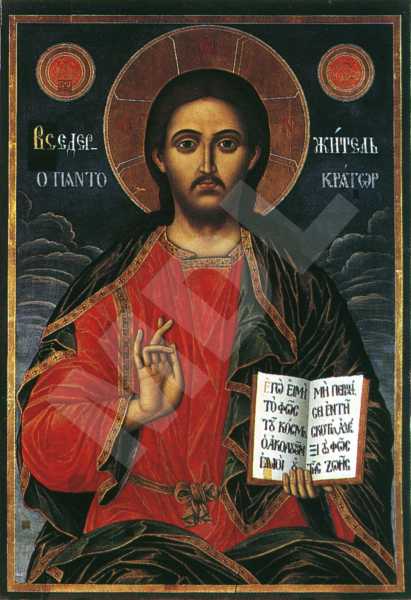Christ Pantocrator
Type:
Icon
Period:
1848 year
Dimiter T. Molerov, born in 1780 in Bansko, son of Toma Vishanov the Moler. One of the best-known painters, a representative of the Bansko school of art, a disciple of his father, influenced by the art of Athos. Author of the murals of the naos in the St Archangels' paraclete in the Rila monastery, the murals in the Church of the Assumption of the Virgin in the Pchelino dependance. In 1840 and 1841 together with his son Simeon Molerov he paints the murals and the sponsors' portraits in St. Nicholas' and St. John of Rila's paracletes in the principal church in the Rila monastery. Among D. Molerov's major achievements in iconography are the following icons: St. Nicholas (1816) from St. Archangel Michael's church in the village of Leshko, Christ All-triumphant with Angels and Cherubim (1833), The Nativity and a Crucifixion from St Elijah the Prophet's church in the village of Usenovo. He has also worked in Belgrade on an invitation by Prince Milosh Obrenovich of Serbia. He died in 1870 in Bansko.
Dimmensions (cm):
113
/ 78
/ 3.2
Location
Country: Bulgaria
Province: Blagoevgrad
Village: Teshevo
Church: St. Great Martyr Dimiter
Source
Country: Bulgaria
Province: Blagoevgrad
Village: Teshevo
Church: St. Great Martyr Dimiter
Description
The iconographic cliche is the traditional one for the theme. Christ is blessing with one of his hands, and is holding an open book with the other.
Iconographical technique: Combined
The technique of the painting is egg-and-distemper. The painting layer is in in comparatively good condition. There are only on the frame, on the right-hand side and in its lower end on the left-hand side mechanical injuries. Down below, in the center, there an scratches. The carnations are executed by means ot the "we in wet" method. The modelling of the garments is done finer; and very precisely. The work betrays the brush of a very skillei icon-painter. The varnish cover is applied in two layers am has yellowed and become much darker.
Base material: Wood
The base is a walnut panel with a narrower panel, glued and nailed on the right side with three iron nails. The panels are hand-made. Mounted on the icon's back at the upper am lower end are two softwood beams. The ground coat is of plaster, thinly laid and about 0,5 mm thick.
State, restoration traces and comments
There are traces of secondary overpaintings. There are on Jesus Christ's book overpaintings with white paint and a new text, the indicative inscriptions are covered, with a dark-red paint and are inscribed anew with white letters. Painted out with a dark-blue paint, roughly, in large spots, in brush strokes, are the original inscriptions. The soundings, which have been carried out, have shown, that this had been don after an attempt to remove the original inscriptions (which is obvious from the marks left behind).


